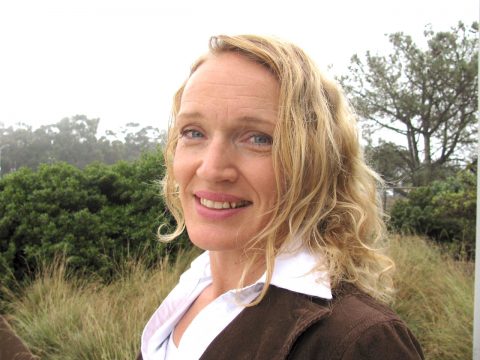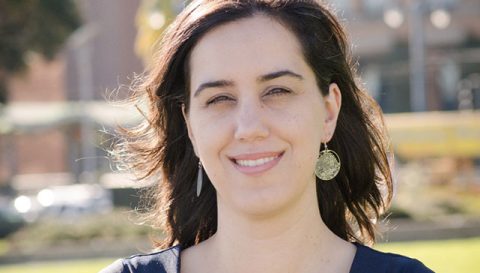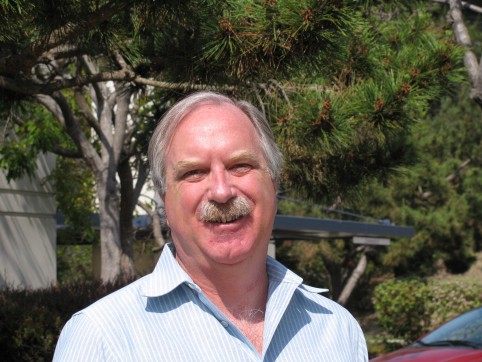Interns in both Rockville, MD and La Jolla, CA participated in our summer 2016 internship program at the J. Craig Venter Institute (JCVI). A total of 19 interns were hired for the summer 2016 program, selected from 578 applicants. Of the 19 interns, six interns were part of the Genomic Scholar Program (GSP) that is a transition program focusing on the leap from a community college to a four-year college using a combination of activities including undergraduate research experience with mentoring and professional development. The interns were mentored by JCVI faculty and research scientists. Mentors design a research project for each intern depending on their education and prior research experience.
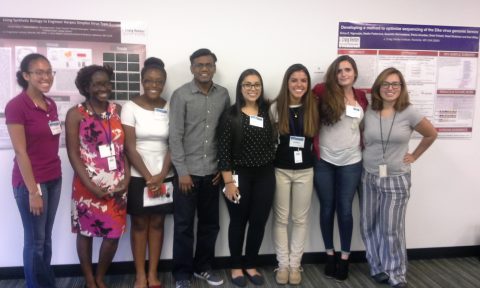
GSP interns Emily Samuels, Rolande Tra Lou, Erica Ngouajio, Raja Venkatappa (mentor), Claudia Najera, Kat Rocha, Tayah Bolt (from La Jolla) and Kenya Platero gather at JCVI Rockville’s poster session.
The involvement of fellows in individually focused research projects was designed to stimulate interest in biomedical research as well as to develop independent critical thinking and communication skills with other team members. In addition to research activities, throughout the summer interns participated in professional development activities that included: education on the importance of documenting research activities and maintaining accurate laboratory records, responsible conduct of research, the art of reading scientific literature (interns participated in weekly science journal clubs that aimed to teach how to dissect and interpret scientific literature), and scientific presentations. All the interns participated in JCVI internal presentations and presented their summer research as a poster.
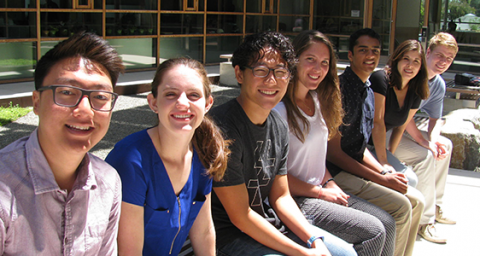
Summer 2016 Interns gather for a picture in the courtyard at JCVI La Jolla.
A brief summary of 2016 interns summer research projects and their mentors are listed below.
| Intern Name(s) | Research Project | Mentor(s) |
| Roshni Bhattachara | Structural implications of unique substitutions found in a paralysis-associated enterovirus D68 clade | Richard Scheuermann |
| Christopher Henderson | Assessment of the Contribution of Ascertainment Cohort to the Genetic Architecture of Alzheimer’s Disease | Nicholas Schork |
| Nathan Lian and Anthony Kang | Experimental Validation of ChIP-Seq Identified Centremeres | Philip Weyman |
| Rohith Kodukula | The Oral Microbiome of Caries in Children: A Study on Twins | Andres Gomez |
| Ian Lamb | Identifying Bacterial Antibiotic Resistance Markers in gut microbes | Manolito Torralba |
| Stephanie Mountain | Hydrogen peroxide tolerance variation among different isolates of Acinetobacter baumannli | Mark Adams and Meredith Wright |
| Kathryn O’Nell | Cell-Type Clustering in Cortical Brain Cells via differential Expression Analysis of Single Nuclei | Richard Scheuermann |
| Josefa Rivera | Identifying new promoter elements in Phaeodactylum tricornutum | Vincent Bielinski, Philip Weyman, and Chris Dupont |
| Jennifer Tuman | Pan-Cancer Analysis of Somatic Mutations in DNA Damage Repair Genes | Alexandra Buckley and Nicholas Schork |
| Ben Grimes | Using Synthetic Biology Methods to Engineer Herpes Simples Virus-1 and Mycoplasma mycoides subspecies capri Genomes | Suchismita Chandran and Sanjay Vashee |
| Nicolette Maragh | Technical Improvements of Sample Preparation for Proteome Analysis | Yanbao Yu |
| Claudia Najera (GSP fellow) | Using Synthetic Biology to Engineer Herpes Simplex Virus Type 1 | Lauren Oldfield and Sanjay Vashee |
| Erica Ngouajio (GSP fellow) | Developing a method to optimize sequencing of the Zika virus genomic termini | Kari Dilley and Reed Shabman |
| Tayah Bolt (GSP fellow) | Reduction of GUS Activity in Phaeodactylum via Episomal hpRNA Expression | Philip Weyman |
| Alexandra Rocha (GSP fellow) | Fibronectin and LRG1 protein interactions in T1D patients | Rajagopala Venkatappa |
| Emily Samuels (GSP fellow) | Cloning and Expression of proteins in Zika Virus and Legionella pneumophila in E. coli | Keehwan Kwon |
| Rolande Tra Lou (GSP fellow) | Filovirus-human protein-protein interaction | Reed Shabman and Rajagopala Venkatappa |
| Carolina Hatanpaa | Constructing a Novel Hidden Markov Model for a tRNA Binding Domain Architecture in the Minimal Cell | Granger Sutton and David Haft |

